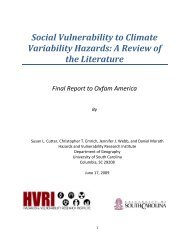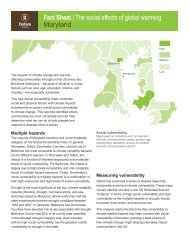Poverty Footprint Study on how the Coca Cola - Oxfam America
Poverty Footprint Study on how the Coca Cola - Oxfam America
Poverty Footprint Study on how the Coca Cola - Oxfam America
You also want an ePaper? Increase the reach of your titles
YUMPU automatically turns print PDFs into web optimized ePapers that Google loves.
Investment in training and capacity building<br />
The <strong>Coca</strong>-<strong>Cola</strong> Company and SABMiIIer’s bottling plants currently make a range of investments in <strong>the</strong> value<br />
chain to enhance <strong>the</strong> skills, knowledge and capacity of different actors, including <strong>the</strong> provisi<strong>on</strong> of technical<br />
assistance and credit programs for sugar producers. For example, in El Salvador, ILC invested $775,000 in<br />
training programs for employees between April 2008 and March 2009 in order to give workers—mainly those in<br />
sales, distributi<strong>on</strong> and marketing—more opportunities for advancement.<br />
Zambian Breweries has also made a number of investments to boost entrepreneurial skills at retail outlets and<br />
channels $92,000 a year into employee training. Zambian Breweries sales representatives also mentor highvolume<br />
retailers to improve business skills development.<br />
Selling <strong>Coca</strong>-<strong>Cola</strong> products is <strong>on</strong>e of <strong>the</strong> easiest ways for a shop owner to make a<br />
living. This is because it is a high–demand product that every<strong>on</strong>e knows. We are in<br />
<strong>the</strong> fabric of <strong>the</strong> small town–drinking <strong>Coca</strong>-<strong>Cola</strong> is an affordable aspirati<strong>on</strong>.<br />
—<strong>Coca</strong>-<strong>Cola</strong> system representative in El Salvador<br />
Recommendati<strong>on</strong>s for follow-up acti<strong>on</strong><br />
Work collaboratively with local communities and workers to identify living wage benchmarks and<br />
c<strong>on</strong>sider making living wages a comp<strong>on</strong>ent of supplier audits.<br />
Find opportunities to improve productivity that increase wage levels without extending <strong>the</strong><br />
workweek.<br />
C<strong>on</strong>sider whe<strong>the</strong>r commercial factors (such as price negotiati<strong>on</strong>s) undermine <strong>the</strong> ability of<br />
business partners to pay a living wage, and work toward integrating living wage principles into<br />
buying practices, including rewarding suppliers that pay a living wage.<br />
Encourage rigorous and regular m<strong>on</strong>itoring to ensure existing labor standards are met.<br />
Employ a “wage ladder” to benchmark progress in wage improvements over time.<br />
Investigate <strong>the</strong> c<strong>on</strong>straints facing small-scale retailer and distributor partners in <strong>the</strong> <strong>Coca</strong>-<strong>Cola</strong><br />
system to identify opportunities to address ec<strong>on</strong>omic and o<strong>the</strong>r barriers to successful growth.<br />
Engage with stakeholders to advocate for improved legal protecti<strong>on</strong>s, health care and capacity<br />
building and training, for those in <strong>the</strong> informal secti<strong>on</strong>s of <strong>the</strong> value chain, and opportunities to<br />
move informal workers to formal employment.<br />
Exploring <strong>the</strong> links between internati<strong>on</strong>al business and poverty reducti<strong>on</strong> 53




